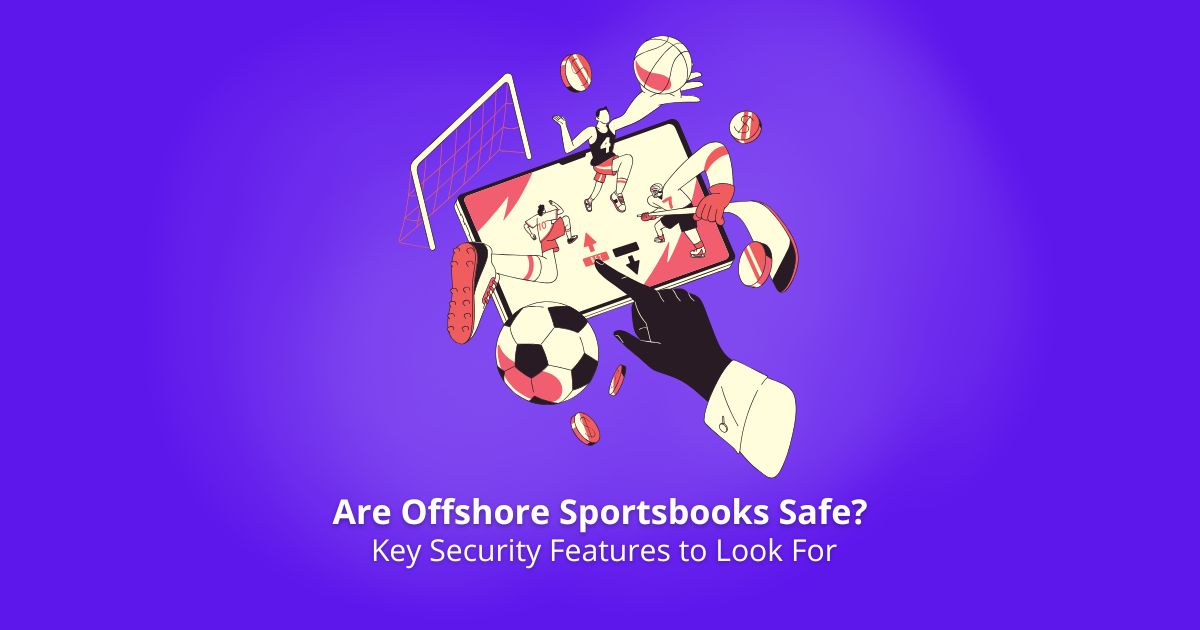Disclaimer:
This article is for informational purposes only and does not constitute legal or financial advice. Online gambling should be approached with caution, and it is important to comply with your local laws and regulations. Gambling can be addictive; please play responsibly. If you have concerns about gambling addiction, seek professional help immediately.
In the growing world of online gambling, offshore sportsbooks have emerged as a popular choice for bettors. With various promotions, larger bonuses, and often fewer restrictions, these sportsbooks can seem like a compelling option. However, it’s natural to wonder about their safety and reliability, especially when your personal and financial information is at stake.

This article dives into the essential security features to consider before betting on offshore sportsbooks and explains why choosing reputable platforms with these features is crucial for a safe experience. As with offshore casino sites, understanding what to look for ensures your money and data remain protected.
1. Licensing and Regulation
One of the first indicators of a trustworthy offshore sportsbook is licensing. Legitimate offshore sportsbooks are licensed and regulated by governing bodies in their home countries. Reliable jurisdictions include Malta, Gibraltar, Curacao, and the Isle of Man, known for their stringent requirements and oversight. Licensing ensures that a sportsbook follows certain security protocols, fair play practices, and responsible gambling policies.
While offshore casino sites may also have similar regulatory frameworks, sports bettors should ensure the sportsbook’s license is from a reputable body. Double-checking licenses, usually displayed at the bottom of the site, and verifying them with the licensing authority can help confirm legitimacy.
2. Encryption Technology
Data encryption is fundamental for any safe online transaction, and offshore sportsbooks must use advanced encryption to protect their users’ information. Secure Sockets Layer (SSL) technology is an industry standard for encrypting data, which means all data exchanged between your browser and the sportsbook is scrambled, making it unreadable to hackers. Look for the “https” in the site URL and a padlock icon to verify that SSL encryption is active.
Offshore casino sites that offer real money wagers also use this technology. However, not all offshore sportsbooks invest in strong encryption, so it’s essential to check. Encryption is your first layer of defense against cybercriminals and makes any data transmitted (like login credentials or financial transactions) secure.
3. Data Privacy and Secure Payment Options
A reputable offshore sportsbook should have a clear privacy policy detailing how it handles, stores, and shares your data. Offshore sportsbooks committed to user safety will avoid selling or sharing personal information with third-party entities. Privacy policies should also align with international data privacy regulations, such as the GDPR (General Data Protection Regulation) or the CCPA (California Consumer Privacy Act).
Secure payment options are another must. Look for sportsbooks that support reliable payment methods like Visa, Mastercard, e-wallets, or cryptocurrencies. Cryptocurrencies are gaining popularity due to their privacy advantages, allowing users to make transactions without revealing personal banking information.
4. Reliable Software Providers and Platform Security
The quality of a sportsbook’s software provider can indicate its commitment to user security. Established providers develop safe, user-friendly interfaces, making it more difficult for hackers to exploit weak spots in the code. Offshore casino sites and sportsbooks powered by reputable software are less prone to glitches, lag, and potential security vulnerabilities. Names like Playtech, Betsoft, and Evolution Gaming are widely recognized for secure, fair gaming software.
Regular platform updates also point to enhanced security. Regularly updated software patches known vulnerabilities, protecting both the sportsbook and its users. If a sportsbook has a blog or news page, it may also post about recent updates or security measures, which is another positive sign.
5. Two-Factor Authentication (2FA)
Two-factor authentication (2FA) is a security feature that requires users to verify their identity twice before accessing their accounts. By implementing 2FA, offshore sportsbooks add an extra layer of security, making it much harder for unauthorized users to access your account. Usually, 2FA involves a password plus a temporary code sent to your mobile device or email.
As with offshore casino sites, this added security measure helps deter cyber attacks and unauthorized logins. Sportsbooks that enable 2FA show a commitment to protecting their users’ accounts and enhancing platform security.
6. Fair Play Audits and RNG Certification
Trustworthy offshore sportsbooks often undergo regular audits by independent third-party organizations. Fair play audits, typically conducted by agencies like eCOGRA or iTech Labs, verify that the sportsbook operates fairly and that its betting outcomes are unbiased and random. RNG (Random Number Generator) certification is essential for sportsbooks that also feature casino games, ensuring each outcome is purely by chance.
Third-party certification provides an extra layer of trust, similar to how offshore casino sites operate. Look for seals or badges from reputable auditing organizations on the sportsbook’s website to confirm its commitment to fair play.
7. Responsive Customer Support
Reliable customer support is a valuable aspect of safe offshore sportsbooks. Accessible, round-the-clock support options such as live chat, email, or phone support indicate a sportsbook’s reliability. If issues arise, like delayed withdrawals or account access problems, prompt customer service can significantly affect your experience and sense of security.
Quality support also reflects the sportsbook’s focus on customer satisfaction and security, as it demonstrates that they prioritize user assistance when it’s most needed. Some offshore sportsbooks even offer support via social media or messengers, adding convenience for users.
Final Thoughts
While betting on offshore sportsbooks offers flexibility and potential benefits, safety should always be a top priority. By examining factors like licensing, encryption, privacy practices, 2FA, and reputable software providers, you can identify trustworthy platforms. With the growing availability of secure offshore casino sites and sportsbooks, responsible bettors have options that prioritize security and transparency.
Choosing a reputable, secure sportsbook can lead to a rewarding betting experience while keeping your personal and financial information safe.